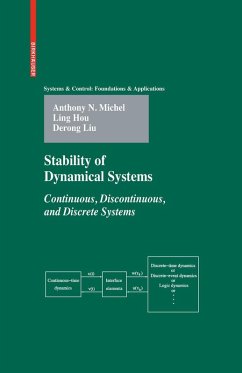In the analysis and synthesis of contemporary systems, engineers and scientists are frequently confronted with increasingly complex models that may simultaneously include components whose states evolve along continuous time and discrete instants; components whose descriptions may exhibit nonlinearities, time lags, transportation delays, hysteresis effects, and uncertainties in parameters; and components that cannot be described by various classical equations, as in the case of discrete-event systems, logic commands, and Petri nets. The qualitative analysis of such systems requires results for finite-dimensional and infinite-dimensional systems; continuous-time and discrete-time systems; continuous continuous-time and discontinuous continuous-time systems; and hybrid systems involving a mixture of continuous and discrete dynamics.
Filling a gap in the literature, this textbook presents the first comprehensive stability analysis of all the major types of system models described above. Throughout the book, the applicability of the developed theory is demonstrated by means of many specific examples and applications to important classes of systems, including digital control systems, nonlinear regulator systems, pulse-width-modulated feedback control systems, artificial neural networks (with and without time delays), digital signal processing, a class of discrete-event systems (with applications to manufacturing and computer load balancing problems) and a multicore nuclear reactor model.
The book covers the following four general topics:
* Representation and modeling of dynamical systems of the types described above
* Presentation of Lyapunov and Lagrange stability theory for dynamical systems defined on general metric spaces
* Specialization of this stability theory to finite-dimensional dynamical systems
* Specialization of this stability theory to infinite-dimensional dynamical systems
Replete with exercises and requiring basic knowledge of linear algebra, analysis, and differential equations, the work may be used as a textbook for graduate courses in stability theory of dynamical systems. The book may also serve as a self-study reference for graduate students, researchers, and practitioners in applied mathematics, engineering, computer science, physics, chemistry, biology, and economics.
Filling a gap in the literature, this textbook presents the first comprehensive stability analysis of all the major types of system models described above. Throughout the book, the applicability of the developed theory is demonstrated by means of many specific examples and applications to important classes of systems, including digital control systems, nonlinear regulator systems, pulse-width-modulated feedback control systems, artificial neural networks (with and without time delays), digital signal processing, a class of discrete-event systems (with applications to manufacturing and computer load balancing problems) and a multicore nuclear reactor model.
The book covers the following four general topics:
* Representation and modeling of dynamical systems of the types described above
* Presentation of Lyapunov and Lagrange stability theory for dynamical systems defined on general metric spaces
* Specialization of this stability theory to finite-dimensional dynamical systems
* Specialization of this stability theory to infinite-dimensional dynamical systems
Replete with exercises and requiring basic knowledge of linear algebra, analysis, and differential equations, the work may be used as a textbook for graduate courses in stability theory of dynamical systems. The book may also serve as a self-study reference for graduate students, researchers, and practitioners in applied mathematics, engineering, computer science, physics, chemistry, biology, and economics.
Dieser Download kann aus rechtlichen Gründen nur mit Rechnungsadresse in A, B, BG, CY, CZ, D, DK, EW, E, FIN, F, GR, HR, H, IRL, I, LT, L, LR, M, NL, PL, P, R, S, SLO, SK ausgeliefert werden.
"This new edition of the book by Michel, Hou, and Liu provides a scholarly and comprehensive view of Lyapunov stability that should be accessible to mathematically inclined graduate students and to many researchers in the control field. It is a welcome addition to the published literature." (N. Harris McClamroch, IEEE Control Systems Magazine, Vol. 36 (1), February, 2016)
"This text have provided comprehensive sources for the materials and results on stability theory of all the dynamical systems ... . The book also contains numerous problems and suggestions for further study at the end of the main chapters. ... book will provide an excellent source of materials for graduate students studying the stability theory of dynamical systems, and for self-study by researchers and practitioners interested in the systems theory of engineering, physics, computer science, chemistry, life science, and economics." (Olusola Akinyele, Mathematical Reviews, November, 2015)
"This text have provided comprehensive sources for the materials and results on stability theory of all the dynamical systems ... . The book also contains numerous problems and suggestions for further study at the end of the main chapters. ... book will provide an excellent source of materials for graduate students studying the stability theory of dynamical systems, and for self-study by researchers and practitioners interested in the systems theory of engineering, physics, computer science, chemistry, life science, and economics." (Olusola Akinyele, Mathematical Reviews, November, 2015)









